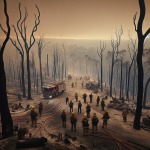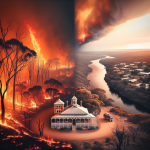Extreme weather conditions have swept across Perth, triggering a dangerous bushfire and a scorching heatwave that have left residents on high alert. As temperatures soar and flames rage, emergency services are tirelessly working to protect both lives and property. Let’s take a closer look at how these events unfolded, the impact they are having, and ways you can stay prepared.
Unprecedented Heatwave Grips Perth
Perth is no stranger to hot summers, but the recent heatwave is far from ordinary. The city has been experiencing days of relentless heat, with temperatures surpassing 40°C (104°F). The Australian Bureau of Meteorology has issued warnings, urging people to avoid outdoor activities during peak hours and remain hydrated.
What’s causing the heatwave? Meteorologists explain that a high-pressure system sitting off the coast is trapping hot air over the region. This is further compounded by dry winds, creating an uncomfortable and dangerous mix.
Health Impacts of the Heatwave
Extreme heat like this isn’t just uncomfortable—it can be deadly. Authorities are raising awareness about the potential health impacts of the heatwave, which include:
- Heatstroke – A serious condition caused by the body overheating, which can be life-threatening if not treated promptly.
- Dehydration – Prolonged exposure to heat can leave people dehydrated, leading to fatigue, dizziness, and confusion.
- Respiratory Issues – For people with pre-existing health conditions, such as asthma, the heatwave can exacerbate breathing difficulties.
Local hospitals have reported a spike in heat-related illnesses, particularly affecting the elderly, young children, and those who work outdoors. This has prompted health officials to reiterate the importance of taking precautions, such as staying indoors in air-conditioned environments and drinking plenty of water.
Raging Bushfire Adds to the Crisis
As if the intense heat wasn’t challenging enough, a bushfire broke out in the Perth Hills area, further destabilizing the region. The high temperatures, coupled with gusty winds, have made the fire difficult to contain. Firefighters are working around the clock to battle the blaze, but shifting weather patterns are complicating their efforts.
Evacuations Triggered
Residents in several neighborhoods have been ordered to evacuate as the fire rapidly spreads. Emergency authorities have issued alerts across affected areas, warning that lives and homes are at risk. Some evacuation centers have been set up to house displaced residents, providing relief during this difficult time.
“We had to leave so quickly,” shared one resident who evacuated her home along with her children and pets. “The fire was moving so fast—there wasn’t any time to hesitate.”
Environmental Toll
Bushfires are not just destructive to human life but also leave a devastating impact on the environment. Hundreds of acres of bushland have already been destroyed, affecting local wildlife and ecosystems. Fire crews are also working hard to prevent the fire from spreading to critical areas like nature reserves and water catchments.
How Are Authorities Responding?
Coordinated efforts are underway to manage the dual crises of the heatwave and bushfire. Here’s what authorities are doing to mitigate the impact:
- Deploying Firefighting Teams – Fire crews from neighboring regions have been called in to assist with the bushfire.
- Issuing Health Alerts – Health officials are providing resources and tips to help residents cope with the heatwave.
- Evacuation Centers – Multiple shelters have been set up to accommodate evacuees, offering food, water, and a place to stay.
- Constant Updates – Authorities are utilizing social media, emergency apps, and local news outlets to keep residents informed of changing conditions.
Premier Roger Cook has reassured the public that “every possible resource is being deployed” to handle the situation. Despite the challenges, there is optimism because of the unified efforts of emergency personnel, volunteers, and local communities.
Messages from Emergency Services
Emergency services have issued a number of important reminders for staying safe during these extreme conditions. Here’s what they had to say:
- Stay Informed – Monitor updates from official sources, like the Department of Fire and Emergency Services (DFES), local news, and weather reports.
- Create an Emergency Plan – Make sure every member of your household knows what to do in case of evacuation.
- Pack an Emergency Kit – Include essentials such as water, non-perishable food, medications, important documents, and a flashlight.
- Keep Hydrated – Drink plenty of water to stay cool and prevent dehydration.
- Avoid Risky Activities – Refrain from activities that could accidentally spark new fires, such as using outdoor BBQs or machinery in grassy areas.
How You Can Help
In times of crisis, the spirit of community support is invaluable. There are several ways you can lend a hand:
- Donate to Relief Efforts – Local charities and organizations are accepting donations to support evacuees and firefighters.
- Volunteer – If it’s safe and you have the expertise, offer your time to assist in evacuation centers or other relief efforts.
- Offer Temporary Shelter – If you’re in a safe area, consider hosting friends, family members, or even pets who have been displaced.
Looking Ahead: Preparing for More Extreme Weather
Climate scientists warn that extreme weather events like this may become more frequent due to global warming. Cities like Perth need to prepare for these scenarios by investing in better infrastructure, early warning systems, and community awareness programs.
As individuals, it’s also important to take steps to make your home and family better equipped to handle future crises. Planting fire-resistant vegetation, creating defensible spaces around your property, and supporting sustainability initiatives are all ways to contribute to long-term resilience.
Conclusion
The Perth heatwave and bushfire serve as harsh reminders of the power of nature and the importance of being prepared. While the situation is undoubtedly challenging, the strength of the community and the tireless efforts of emergency workers offer hope in the face of adversity.
Stay safe, stay informed, and take every precaution necessary to protect yourself and your loved ones during these testing times.
“`


